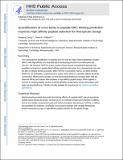| dc.contributor.author | Zeng, Haoyang | |
| dc.contributor.author | Gifford, David K | |
| dc.date.accessioned | 2020-12-23T20:34:01Z | |
| dc.date.available | 2020-12-23T20:34:01Z | |
| dc.date.issued | 2019-08 | |
| dc.date.submitted | 2019-03 | |
| dc.identifier.issn | 2405-4712 | |
| dc.identifier.uri | https://hdl.handle.net/1721.1/128919 | |
| dc.description.abstract | The computational identification of peptides that can bind the major histocompatibility complex (MHC) with high affinity is an essential step in developing personal immunotherapies and vaccines. We introduce PUFFIN, a deep residual network-based computational approach that quantifies uncertainty in peptide-MHC affinity prediction that arises from observational noise and the lack of relevant training examples. With PUFFIN's uncertainty metrics, we define binding likelihood, the probability a peptide binds to a given MHC allele at a specified affinity threshold. Compared to affinity point estimates, we find that binding likelihood correlates better with the observed affinity and reduces false positives in high-affinity peptide design. When applied to examine an existing peptide vaccine, PUFFIN identifies an alternative vaccine formulation with higher binding likelihood. PUFFIN is freely available for download at http://github.com/gifford-lab/PUFFIN. Machine-learning models that predict the binding affinity of a peptide-MHC pair are essential in peptide-based therapeutic design, but state-of-the-art methods provide point estimates of affinity that do not consider measurement noise and model uncertainty. We introduce PUFFIN, a method that quantifies the prediction uncertainty and prioritizes peptides with “binding likelihood” to achieve improved accuracy in high-affinity peptide selection for therapeutic design. | en_US |
| dc.description.sponsorship | National Institute of Health (Grant R01CA218094) | en_US |
| dc.language.iso | en | |
| dc.publisher | Elsevier BV | en_US |
| dc.relation.isversionof | http://dx.doi.org/10.1016/j.cels.2019.05.004 | en_US |
| dc.rights | Creative Commons Attribution-NonCommercial-NoDerivs License | en_US |
| dc.rights.uri | http://creativecommons.org/licenses/by-nc-nd/4.0/ | en_US |
| dc.source | PMC | en_US |
| dc.title | Quantification of Uncertainty in Peptide-MHC Binding Prediction Improves High-Affinity Peptide Selection for Therapeutic Design | en_US |
| dc.type | Article | en_US |
| dc.identifier.citation | Zeng, Haoyang and David K. Gifford. "Quantification of Uncertainty in Peptide-MHC Binding Prediction Improves High-Affinity Peptide Selection for Therapeutic Design." Cell Systems 9, 2 (August 2019): P159-166.e3 © 2019 Elsevier Inc | en_US |
| dc.contributor.department | Massachusetts Institute of Technology. Computer Science and Artificial Intelligence Laboratory | en_US |
| dc.contributor.department | Massachusetts Institute of Technology. Department of Electrical Engineering and Computer Science | en_US |
| dc.relation.journal | Cell Systems | en_US |
| dc.eprint.version | Author's final manuscript | en_US |
| dc.type.uri | http://purl.org/eprint/type/JournalArticle | en_US |
| eprint.status | http://purl.org/eprint/status/PeerReviewed | en_US |
| dc.date.updated | 2020-12-15T17:09:55Z | |
| dspace.orderedauthors | Zeng, H; Gifford, DK | en_US |
| dspace.date.submission | 2020-12-15T17:09:57Z | |
| mit.journal.volume | 9 | en_US |
| mit.journal.issue | 2 | en_US |
| mit.license | PUBLISHER_CC | |
| mit.metadata.status | Complete | |
